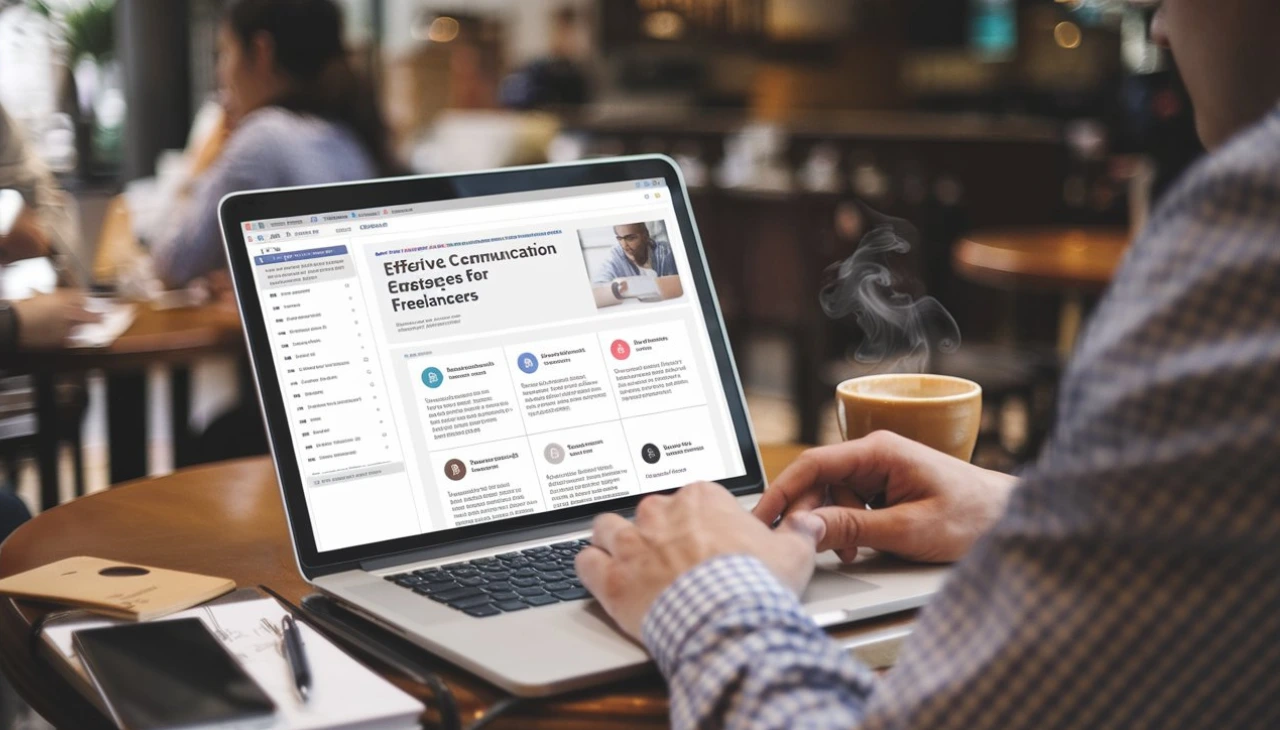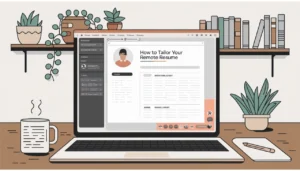Freelancing is a work environment offering freedom to work almost independently. At the same time, it comes with the inability to exist without challenging moments. Effective communication is paramount for success in freelance management. It will make relationships with clients even stronger, increases the probability of being entrusted with new projects, and also ensures proper outputting of work.

But communicating sometimes comes out as a huge challenge for freelancers. Time and distance can create obstacles in forming rapport, which can, again, lead to delaying the solutions to misunderstandings. Different clients from different backgrounds sometimes bring along with them cultural differences and potential language barriers. A really big challenge is managing expectations and ensuring that clients stay updated all through the lifecycle of a project. Therefore, overcoming them requires intentional effort and strategic communication techniques
The Power of Effective Communication in Freelancing
To be successful in freelancing, one requires great communication skills- that is not only about exchanging information but building up relations and knowing what a client wants; results are outstanding when carrying proper good communication skills. The most powerful tool or component of effective communication is active listening.
Actually, active listening means much more than just hearing the words a client says. It calls for all ears-on attention to his tone of voice, body language, and possibly any underlying emotions that fuel the message he’s trying to send in his words. When you are an active listener, clients appreciate that you value their input and are really interested in trying to understand them. Such trust and rapport often build stronger working relationships.
Clear and concise communication happens to be another inevitable aspect of successful communication. When messages are ambiguous or unclear, there is a likelihood of misunderstandings. It is important to use simple language, avoid jargon, and be specific in communication. In this way, you can keep everyone on the same page and minimize the possibilities of errors or delays.
Finally, proactive communication is the way to keep the client on positive terms. That is, as a customer-oriented person you should update the client on how things are working, and you should remind them of potential issues early so that you proactively get feedback as well. Being proactive shows commitment towards the project and presents such an attitude before the clients as if you are ahead of their needs. Such a proactive approach helps the client build trust with you and avoid misunderstandings.
In short, effective communication is the mantra for freelancers. It includes listening, clear and concise communication, and above all, being proactive can help build strength in relationships and deliver results superiorly and therefore lead to long-term success in freelancing.
Managing Expectations and Deliverables
Good communication will help the freelancer achieve a middle ground in managing the expectations of clients and then meeting the deliverables of the project. Freelancers can explain what the scope of the project is, how long it will take, and what to expect once it is completed as a way of preventing miscommunication.
Setting clear expectations
Project scope: Define the project scope: Explain to the client what will be included in the project by stating clearly what is excluded. Project scope document should give specific deliverables with expected results.
Realistic timelines: Develop a high-level project timeline incorporating key milestones and deadlines. As much as it is possible, be very realistic with your estimate, and also consider some of the challenges that may be reflected within the timelines .
Define deliverables: Clearly define what the final deliverables will be and how they will be presented. Bring some visual aids or examples to help them understand what the expected outcome of the final deliverables will be.
Address challenges: Clearly note possible challenges or risks that might arise in the course of the project. Come up with the solution in case there is a change and how you will communicate with the client.
Effective Project Management
Application of Project management tools: The more you apply a project management software or tool to monitor the progress, carry out the task, and keep in touch with your client, the more organized you will be and informed by tools like Asana, Trello, or Basecamp.
Regular communication: Update the client, inevitably all through the project, by giving them updates on progress, clearing concerns and giving an advance notice every time you are making some changes or changes that may cause delay on the timeline.
Document everything: Keep a detailed record of all communications and decisions made within the project. This will become handy in case of any disputes or misunderstandings.
Request feedback: Get regular feedback from clients so that the project is on track and satisfying the needs and expectations of the client. State problems or concerns on a timely basis.
Controlling Change
Be flexible: Accept changes in project scope and timelines. Communication channels with the clients should remain open. Discuss the changes and how it could affect the scope of the project as well as timeline.
Evaluate the impact: Find out how proposed changes will affect the project; could increase the cost or cause delays. Communicate the implications clearly to the client.
Negotiate the terms: If change is necessary, negotiate new terms or conditions for the client with regard to new scope or timeframe.
Document changes : Write document all the agreed-upon changes in writing to clarify misunderstandings and ensure that both parties are on the same page.
Some strategies that freelancers follow would include managing expectations, providing successful projects, and building good relationships with clients to manage the hopes of being successful.
Overcoming Communication Barriers
- Effective communication is the backbone of a strong relationship between freelancers and their clients regarding the successful execution of projects. However, communication really becomes tough to handle when dealing with the clients from different cultural backgrounds or when several barriers of languages and technology are created. Here are some strategies that would help freelancers overcome these barriers and create an effective medium of communication:
- Cultural Differences
- Research cultural norms: For example, before working with a client from a different culture, you should research their customs, values, and communication styles. In this way, you can prevent miscommunications that could be generated due to differences in communication.
- Be aware of the non-verbal. Non-verbal communication such as handshakes, eye contact and body space varies greatly across cultures. Get familiar with the non-verbal cues you portray and recognize those of your clients.
- Cultural intermediary: In case the communication process between you and your client is coming out to be tough, sometimes a cultural intermediary may ease the gap.
- Language
- Use simple language: Steer clear of those complicated words or jargons you may be using. Stick to a straightforward language that is easy to understand.
- Use translation tools: If you do not know the language spoken by your client, then you could use some translation tools such as Google Translate. Note that these translation tools may not be 100 percent accurate and thus should be verified.
- Engage a professional translator: To be sure of the right information when dealing with important documents or meetings, you might require hiring a professional translator to get this particular understanding done for you.
Building Trust and Credibility: The Cornerstones of Freelancing Success
The most important thing in the competitive world of freelancing is to establish trust and credibility. This can only come from a good communicator. The basis of building trust and respect is a consistent, transparent, and professional reputation.

Consistency and Reliability:
Predictability: Predictability is developed through consistent communication. The client will be able to anticipate your responses and actions. As a result of predictability, reliability generates trust as the client feels comfortable with your ability to serve what you promise.
Dependability: Clients find a freelancer dependable when he or she has the capability to deliver high-quality work and to meet deadlines. This kind of reputation generates repeat business and referrals from them and in turn brings more work for freelancers.
Professionalism: Confirmed through constant communication, a freelancer portrays professionalism and pays attention to details. Clients appreciate such freelancers because they are well organized, reliable, and responsive.
Transparency and Honesty:
Open Communication: It means being transparent to the clients, open communication, and honesty in the face of problems or failures. It builds trust rather than misunderstanding.
Responsibility: Transparency before the clients shows that one is accountable in action, not afraid to accept responsibility. This sets credibility and respect.
Problem-Solving: If possible threats are known beforehand, then there is a higher chance for them to be understood and accepted by the clients. Transparency is helpful in cooperative problem-solving as well as relationship building.
Professionalism:
Etiquette and Courtesy: One should be polite, kind, and respectful at all times of communications with clients. This includes being a positive and cool individual even under difficult situations.
Good Communication: This involves good messages, clear, concise, and well-structured. The jargon and highly technical terms that may confuse the clients should be avoided.
Timeliness: Quick response and timely delivery of the delivers are imperative to maintaining professionalism. Do not delay communication and miss deadlines.
Consistent demonstration of reliability, transparency, and professionalism helps a freelancer build trust with his clients and in turn creates an awareness for quality. Indeed, trust and credibility can provide wealth in the long run and lead to a healthy freelance career.
Conclusion
Recap Key Points
We have discussed many effective communication strategies that would make your freelancing career go so much better. True listening to your clients, clear concise communication, and proper management of expectations could help you get strong relationships and great successful projects.
Do remember the proactive communication, clear expectations, and staying adaptable with changes. We have to address problems between cultural differences and language or technology barriers and adapt creatively to address these matters. Trust and credibility in the long run build one successfully.
Calling for More Conquests
This post has valuable information, but one can never know too much about communication. Explore the following resources for further knowledge on these matters:
Online courses: Coursera, Udemy, and LinkedIn Learning have courses on communication skills, interpersonal relationships, and project management.
Books: Read books by expert communicators for further insights and practical tips.
Networking groups: Get in touch with freelance professionals within your industry to share your problems and learn from theirs.
Communication workshops: Communication skill workshops or seminars will provide you with personalized coaching and feedback.
Call to Action
Do not hesitate to post your insights and experiences in the comment box. Do you ever encounter communication barriers in your freelancing work? Which methods have you discovered work well? Your knowledge might be invaluable to others who face many challenges in freelancing.
Practicing active effective communication will get you better relationships with clients, a good reputation, and therefore success in your freelancing career.
Effective Communication Strategies for Freelancers
Good communication is essential for freelancers to maintain quality relationships with clients, win new projects, and achieve greater output. However, freelancing operates with unique challenges in the aspect of communication. They are remote workers dealing with diverse categories of clients and different expectations. With the right pattern of communication, all these challenges can be dispelled and go on to collaborate effectively.

Creating Good Relations with Clients
While the most vital thing about freelancing is the trust relationship with clients, one can manage to make sure that, through an active listening of their concerns, needs, and feedback, there should be immediate and professional responses. This will create a trustworthy and collaborative atmosphere. One thing that can be achieved in this line is clear and concise communication that will prevent misunderstanding and ensure everyone is on the same page.
Managing Expectations and Deliverables
The other factor is that the scope of the project, timeline, and deliverables from the outset are clearly expected by the clients. The clarity of these aspects goes a long way in preventing freelancers from misjudging the scope and thus being able to effectively satisfy their clients upon its completion. The management tools and techniques applied keep the freelancers organized, communicate the progress involved, and meet the deadlines required.
Communication Barriers Overcome
The freelancer is obliged to be aware of cultural, language, and technology discrepancies at all times to overcome communication barriers. And one can clearly tell the client that he will use simple language avoiding jargon or get translation tools in cases of language differentials. It helps him to address technological issues and respond professionally.
Building Trust and Credibility
Building a relationship of trust and credibility will only be achieved by clients in the long term. It demands consistency and reliability in communication, transparency and honesty in reporting project progress, and professionalism at all times. Demonstrate integrity and reliability to become a trusted partner by attracting repeat business.
Some More Tips
To make your communication strategies more efficient, here are some additional tips:
Real-world applications : Using concrete examples of how freelancers have been successful in using effective communication techniques.
Use infographics and diagrams, etc.: To present your content in an interesting and understandable way.
Optimize for search engines : Optimization of keywords of your content using relevant keywords and phrases so that you rank high in a search engine for its visibility.
This will then translate into strong communication skills, long-term relationships with clients, and a more positive and rewarding experience as freelancers. Equally important to professional success is communication, which plays a central role in ensuring positive interaction with others.
Frequently Asked Questions (FAQs) About Effective Communication Strategies for Freelancers
General Communication
How to be a better active listener?
Concentration through eye contact with the speaker; avoid distractions
Ask for clarification, if you did not get what they mean to say
Summarize what you heard to show understanding
How would you accommodate the diversity of styles in dealing with clients?
I will be flexible and adjust my style to theirs.
Aware of differences in cultures and will not assume.
Be clear and simple in using language.
How can I avoid misunderstandings with my clients in communication?
Be explicit and avoid any ambiguous language.
Use the presentation of visual or examples so that things can be made a bit more clearer sometimes.
Ask questions from the other person to confirm for yourself whether they understand or not.
Managing Expectations and Deliverables
How can I make clients expect clear project scope, timelines, and deliverables?
Prepare nice project plans which may be detailed while enlisting the scope, timeline, and deliverables.
Utilize project management software to track progress and report updates.
Open to discussion and amending expectations when necessary
How can I manage changes in project requirements or timeline correctly?
Let the clients know about change immediately and clearly
Evaluate the change on scope and timeline of the project.
Discuss possible new terms or deadlines
Effective Communication Barriers
How can I communicate easily with clients from other cultures?
Research the cultural norms and customs.
Be sensitive on the language and, therefore use simple language.
Avoid stereotyping and assuming
How would I overcome the problem of language barrier when communicating with my clients?
Use translation tools or hiring a translator.
Learn basic phrases in the client’s language.
Make communication simple and avoid technical jargon
How can I overcome the technological challenges affecting communication?
Always have an alternative way of communication if there is a technical hitch.
The communication channels and tools used must be trustworthy.
In other words, bear with the technicality if such occurs.
Building Trust and Credibility
How would I build trust and credibility with my clients?
Show consistent and reliable communication.
Be honest and open about the project progress.
Do what you promise to do
Be punctual.
Be professional.







